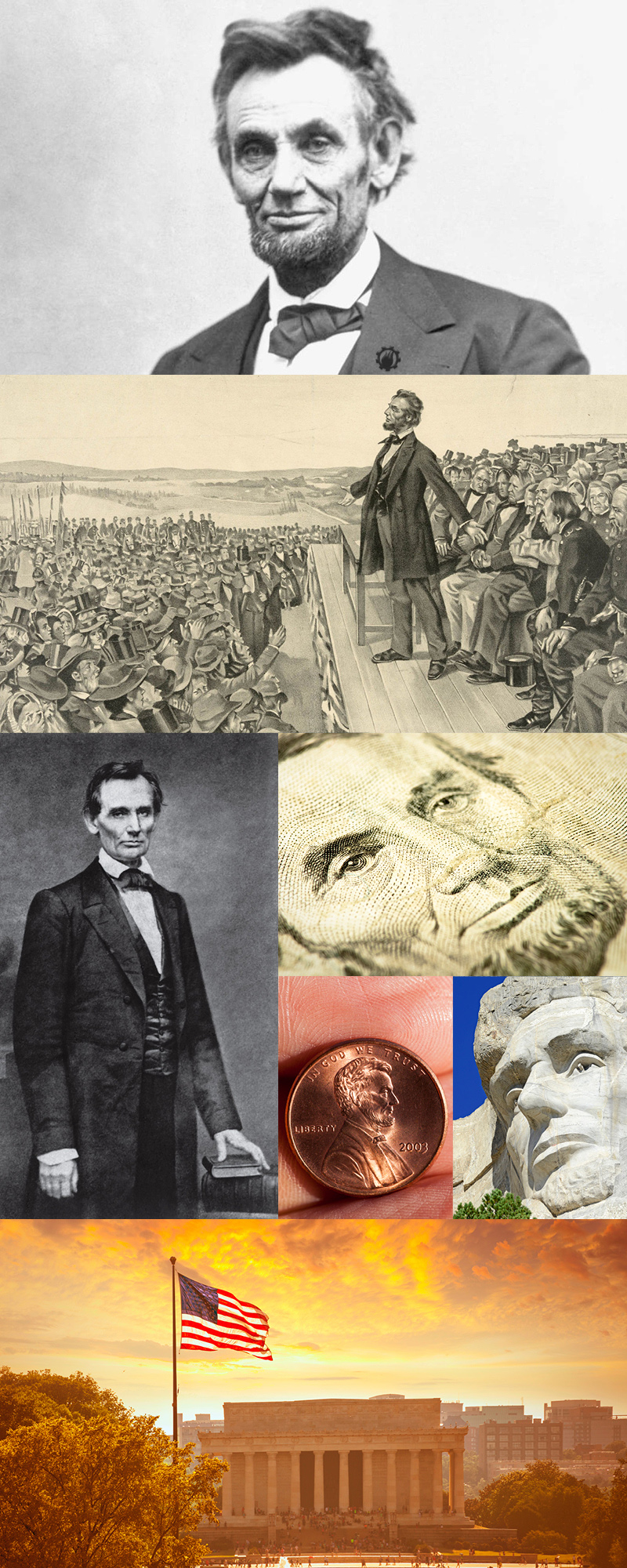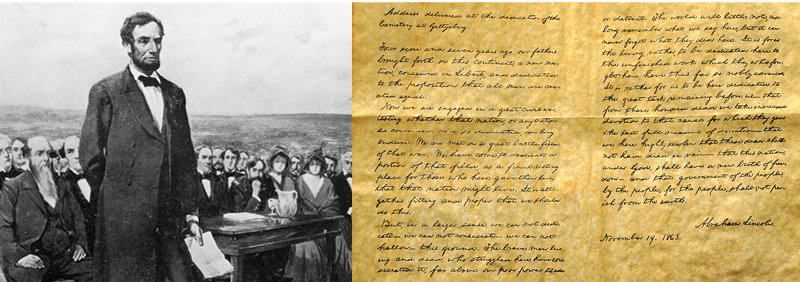Equal.

Abraham Lincoln delivered the Gettysburg Address on the 19th of November, 1863.
Over 150 years ago, powerful words were delivered to the nation. May we rejoice on Monday when we recognize the anniversary of the Gettysburg Address.
- The Gettysburg Address, in which President Abraham Lincoln spoke of all men being created equal and “government of the people, by the people, for the people” was delivered on Nov 19th, 1863. It took place at the dedication of the Soldiers’ National Cemetery in Gettysburg, Pennsylvania, four and a half months after the pivotal American Civil War battle there.
- Following the Battle of Gettysburg on July 1–3, 1863, the removal of the fallen Union soldiers from the Gettysburg Battlefield graves and their reburial in graves at the National Cemetery at Gettysburg began on October 17. In inviting President Lincoln to the ceremonies, David Wills, of the committee for the November 19 Consecration of the National Cemetery at Gettysburg, wrote, “It is the desire that, after the Oration, you, as Chief Executive of the nation, formally set apart these grounds to their sacred use by a few appropriate remarks.”
- On the train trip from Washington, D.C., to Gettysburg on November 18, Lincoln was accompanied by three members of his Cabinet, William Seward, John Usher and Montgomery Blair, several foreign officials, his secretary John Nicolay, and his assistant secretary, John Hay. During the trip Lincoln remarked to Hay that he felt weak; on the morning of November 19, Lincoln mentioned to Nicolay that he was dizzy. (Hay later noted that during the speech Lincoln’s face had “a ghastly color” and that he was “sad, mournful, almost haggard.”)
- The short speech had more dynamic impact following, as it did, a two-hour oration (yawn!) by Edward Everett, one-time Secretary of State.
- John Hay, a close friend of the President, recorded how Lincoln wrote and delivered the speech:
“Lincoln was very silent all the previous evening after dinner. No one else being present he walked to and fro’ in his room apparently thinking deeply. He went to bed early, and when he came down to breakfast, he looked unwell, and said he had slept little. On the train to the cemetery, he was silent for a considerable while, and then he asked me for some writing paper. On his knee he then wrote out his speech in full, exactly as it has come down to us. The impression left on me was that Lincoln was merely transcribing from memory the words he had composed during the night.”
“When we reached the battlefield, Lincoln was nervous and apparently not well. Everett spoke eloquently but very long. Then Lincoln rose, holding the papers he had written on the train. He did not read, but spoke every word in a clear, ringing, resonant, vibrating voice. His speech occupied only a few minutes in delivery. It was listened to with breathless attention and when it came to an end there was at first no cheering, but an audible indrawing of deep breath as from an audience that had been profoundly moved.”
“In the silence of the next moment, Everett leapt to his feet again and said, as nearly as I can remember, this: ‘We have just listened to a speech that will live through the ages’.”
- Despite the historical significance of Lincoln’s speech, modern scholars disagree as to its exact wording, and contemporary transcriptions published in newspaper accounts of the event and even handwritten copies by Lincoln himself differ in their wording, punctuation, and structure. Of these versions, the Bliss version, written well after the speech as a favor for a friend, is viewed by many as the standard text. Its text differs, however, from the written versions prepared by Lincoln before and after his speech. It is the only version to which Lincoln affixed his signature, and the last he is known to have written.
Four score and seven years ago our fathers brought forth on this continent, a new nation, conceived in Liberty, and dedicated to the proposition that all men are created equal.
Now we are engaged in a great civil war, testing whether that nation, or any nation so conceived and so dedicated, can long endure. We are met on a great battle-field of that war. We have come to dedicate a portion of that field, as a final resting place for those who here gave their lives that that nation might live. It is altogether fitting and proper that we should do this.
But, in a larger sense, we can not dedicate—we can not consecrate—we can not hallow—this ground. The brave men, living and dead, who struggled here, have consecrated it, far above our poor power to add or detract. The world will little note, nor long remember what we say here, but it can never forget what they did here. It is for us the living, rather, to be dedicated here to the unfinished work which they who fought here have thus far so nobly advanced.
It is rather for us to be here dedicated to the great task remaining before us—that from these honored dead we take increased devotion to that cause for which they gave the last full measure of devotion—that we here highly resolve that these dead shall not have died in vain—that this nation, under God, shall have a new birth of freedom—and that government of the people, by the people, for the people, shall not perish from the earth.
- After the speech, when Lincoln boarded the 6:30 pm train for Washington, D.C., he was feverish and weak, with a severe headache. A protracted illness followed, which included a vesicular rash; it was diagnosed as a mild case of smallpox. It thus seems highly likely that Lincoln was in the prodromal period of smallpox when he delivered the Gettysburg address.
- In an oft-repeated legend, Lincoln is said to have turned to his bodyguard Ward Hill Lamon and remarked that his speech, like a bad plow, “won’t scour”. According to Garry Wills, this statement has no basis in fact and largely originates from the unreliable recollections of Lamon. In Garry Wills’s view, “[Lincoln] had done what he wanted to do [at Gettysburg]”.
- In a letter to Lincoln written the following day, Everett praised the President for his eloquent and concise speech, saying, “I should be glad if I could flatter myself that I came as near to the central idea of the occasion, in two hours, as you did in two minutes.” Lincoln replied that he was glad to know the speech was not a “total failure”.

Download the speech in Lincoln’s handwriting HERE.
Watch this short Ken Burns PBS piece on the Gettysburg Address HERE.



Leave a Reply
Want to join the discussion?Feel free to contribute!